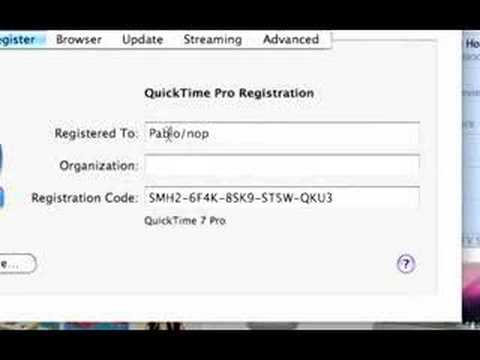
- #Quicktime for mac os lion for mac os x
- #Quicktime for mac os lion mac os x
- #Quicktime for mac os lion upgrade
- #Quicktime for mac os lion password
- #Quicktime for mac os lion download
#Quicktime for mac os lion mac os x
#Quicktime for mac os lion download
The Server portion of Lion is available as a separate download from the Mac App Store for US$49.99, which is in addition to the purchase price of Lion itself.
#Quicktime for mac os lion for mac os x
On August 4, 2011, Apple started to take orders for Mac OS X Lion's USB installation flash drives for $69.99.
#Quicktime for mac os lion upgrade
The only prior version of OS X that supports the Mac App Store is Snow Leopard, which implied that any machines that support Lion currently running Tiger or Leopard would first have to be upgraded to Snow Leopard, as opposed to allowing a direct upgrade to Lion.Īpple later announced two alternative distribution mechanisms for the benefit of users without broadband Internet access: in-store downloads at retail Apple Stores, and a USB flash drive containing the OS, priced at US$69, available through the online Apple Store beginning in August. Instead, the operating system was said to be available exclusively as a download from the Mac App Store for US$29.99. Īpple did not initially announce any physical media distribution for Lion, such as a set of CD-ROMs or a DVD-ROM as used for past releases. The specific release date of July 20 was not confirmed until the day before, July 19, by Apple CFO, Peter Oppenheimer, as part of Apple's 2011 third-quarter earnings announcement. On June 6, 2011, at the Apple Worldwide Developers Conference, it was announced that the official release for Lion would be in July 2011. Mac OS X Lion was announced alongside iOS 5 and iCloud at WWDC 2011 at Moscone West. Īlthough originally paid, Apple later allowed free downloads of the OS, starting on June 30, 2021. Lion is the final release whose development was overseen by Bertrand Serlet, considered the "founding father of Mac OS X". As of October 2011, Mac OS X Lion had sold over six million copies worldwide. Apple reported over one million Lion sales on the first day of its release. Lion was released to manufacturing on July 1, 2011, followed by its final release via the Mac App Store on July 20, 2011. Other developer previews were subsequently released, with Lion Preview 4 (11A480b) being released at WWDC 2011. On February 24, 2011, the first developer's preview of Lion (11A390) was released to subscribers to the Apple Developer program. It brought many developments made in Apple's iOS, such as an easily navigable display of installed applications, to the Mac, and includes support for the Mac App Store, as introduced in Mac OS X 10.6 Snow Leopard version 10.6.6.
#Quicktime for mac os lion password
Note the odd entry belonging to user ‘dev’ in the screenshot: the 1970 date is the start of unix time, and its appearance here indicates that the password hasn’t been changed since time began!…or, more seriously, that this password hasn’t been changed since the user account was created.OS X Lion, also known as Mac OS X Lion, (version 10.7) is the eighth major release of macOS, Apple's desktop and server operating system for Macintosh computers.Ī preview of Mac OS X 10.7 Lion was publicly shown at the "Back to the Mac" Apple Special Event on October 20, 2010. read /Users/"$currentUser" | grep -A1 passwordLastSetTime | grep real | awk -F'real>| /dev/null done list /Users | egrep -v '^_|daemon|nobody') for i in $u do printf

We can accomplish this from the command line ( aka by using the Terminal.app) with the following one-liner (a raw text version is also available from my pastebin here):Įcho echo Password Last Changed: u=$(dscl. Alternatively, if you or one of your users is experiencing login difficulties, you might want to check that the password hasn’t been changed unbeknownst to (or unremembered by) the user. For example, you might want to enforce a policy of having users (or yourself!) change login passwords after a given period. Sometimes it can be useful to know when the user’s password was last changed.


 0 kommentar(er)
0 kommentar(er)
